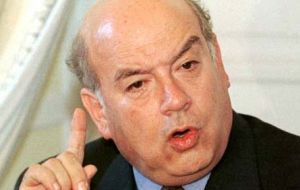MercoPress. South Atlantic News Agency
Regional efforts to solve Bolivia's political impasse
 Insulza : OAS has been working for weeks trying to bring the dissenting sides together
Insulza : OAS has been working for weeks trying to bring the dissenting sides together The Organization of American States Secretary General, OAS, Jose Miguel Insulza praised on Monday the Bolivian promoters of the Santa Cruz autonomy referendum for having expressed no secessionists or contrary to law intentions.
"All participants in the situation have expressed that this (territorial division) is not on the table, and that they are hopeful of a dialogue", said OAS Insulza. "We even received a letter from the governors, including from Santa Cruz in which they underline their total adherence to national unity and reject any attempt of dividing Bolivia or a rupture of the democratic system". "This commitment from the Bolivian opposition makes us feel satisfied", added Insulza who arrived in Bolivia for a mediation effort. From Washington the State Department spokesperson Tom H Casey encouraged the dialogue between the government in La Paz and Santa Cruz. "Given Sunday's referendum in Santa Cruz, the US encourages the government of Bolivia and the opposition to resume dialogue and solve differences which persist, and concern all Bolivians, in a peaceful and long lasting manner" said Mr. Casey. The US supports "all efforts from OAS, the Catholic Church and other countries" to facilitate the dialogue, added the US official. OAS has been working for weeks trying to bring the dissenting sides together. Argentina, Brazil and Colombia who are part of a "group of country friends of Bolivia" said they were "convinced more than ever that it was necessary to establish a franc, open, wide ranging dialogue between the main Bolivian political actors to ensure the preservation of the democratic institutions and the territorial integrity of Bolivia". In Caracas the Deputy Foreign Affairs minister Francisco Arias Cardenas said Sunday "had been a resounding victory" for President Morales given the very low voting participation in the Santa Cruz referendum. In Ecuador president Rafael Correa said the elites of Bolivia, Venezuela and Ecuador are trying to "destabilize" the progressive governments of Latinamerica. In Brazil the Sao Paulo press gave ample coverage to the autonomy referendum and forecasted the country was heading for an "institutional impasse" and "political chaos". "In many ways Bolivia is a land with no law, rather too many laws", and nobody knows which is valid said the influential newspaper which reflects Brazil's business community interests. With a debilitated Judicial branch and a paralyzed Legislative, "Bolivians are living a crisis which can only worsen", adds Estado de Sao Paulo. "The good news is that analysts insist that the chances of a military coup are remote" On Sunday 84% of Santa Cruz voters approved the autonomy referendum, although abstention was close to 40%. Santa Cruz and other rich provinces of Bolivia reject the Socialist oriented, anti market, farm land distribution and gas and oil royalties' policies of Evo Morales, the first indigenous president of the landlocked country.




Top Comments
Disclaimer & comment rulesCommenting for this story is now closed.
If you have a Facebook account, become a fan and comment on our Facebook Page!